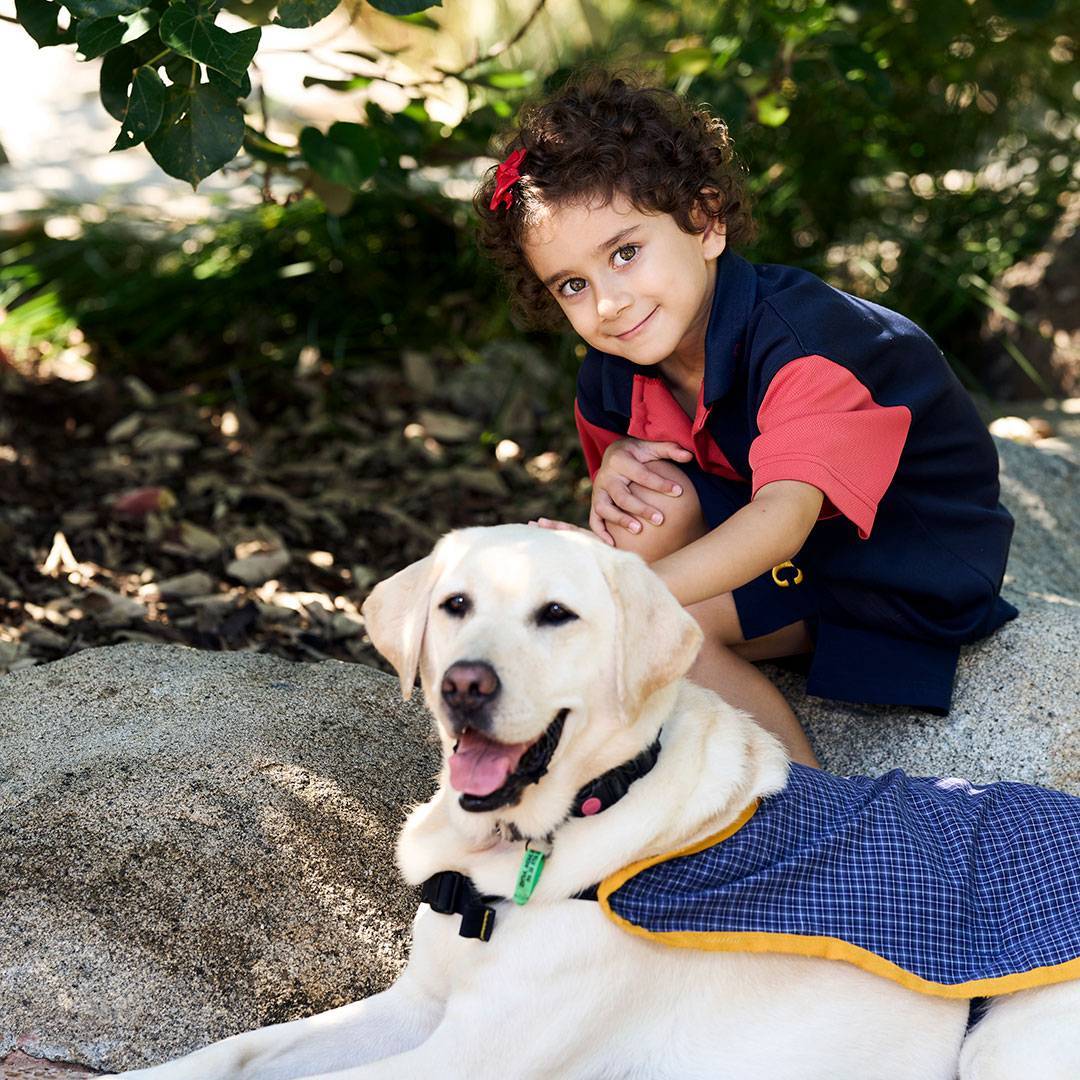Love dogs? Us too! That’s why we were super excited to spend the morning with Lucy: Golden Labrador, therapy dog, and the newest addition to the wellbeing team at Immanuel Lutheran College.
The bond between humans and dogs is a special one. Though we don’t speak the same language, the deep empathy that exists between the two species is immeasurable.
We all know that dogs make the best of friends. But our much-loved furballs can also help heal people in the most unexpected ways. Today, therapy dogs play essential roles in rehabilitation, aged care and emotional support. A dog can break down barriers and bring joy to people in their own unique and loving way. Their presence can give comfort, companionship and emotional support to people of all ages. The wagging of a tail and the physical touch can instantly positively impact a person’s health and mental wellbeing.
“The evidence is pretty clear now that animals have a hugely positive impact on our emotions,” says Immanuel Lutheran College Principal Colin Minke. “Animals are a wonderful way to de-escalate situations, and connecting with a dog can make a big difference.”
Meet Lucy the Therapy Dog
Lucy the Golden Labrador officially started her role as Therapy Dog at Immanuel Lutheran College at the start of 2023. And her impact on the College community has already been remarkable.
“It’s been particularly significant for those students who struggle to get to school or with some of their learning,” says Mr Minke. “A dog can make a huge difference in smoothing that transition.”
Lucy is cared for by Gayla Matthews, Chaplain at Immanuel Lutheran College.
“We have students that have high anxiety or school avoidance. And we have students who don’t cope in a regular classroom like other students,” says Gayla. “So they can come and spend time with Lucy. They can brush her and groom her so they get used to caring for someone other than themselves. And spending this time helps the child to self-regulate and calm down.”
Lucy spreads happy, comforting vibes in all corners of the College.
“She could be at an assembly or welcoming the Preppies into their classroom. Sometimes the nurse might call saying, ‘We have someone who has fallen over, and we need Lucy now’!” Gayla says.
“We even take Lucy to the seniors before exams, and she’ll be present with the kids,” adds Principal Minke. “She is such a calming influence for them. That, combined with our work in the mindfulness space, puts the students in a good frame of mind when they’re nearing high-stakes exams.”
“Most of all, Lucy is really calm,” says Gayla.
“I can take her anywhere around the College, and she is always so composed— from worship that can be quite loud to being surrounded by a group of excited kindy kids. Her presence changes the whole atmosphere. When she’s calm, the children are calm. It’s beautiful, and it’s contagious,” says Gayla.
Lucy’s presence is also soothing for the staff, with teachers benefitting from giving Lucy a pat at some point in their busy day. Parents and visitors naturally gravitate to her too!
“When she’s calm, the children are calm. It’s beautiful and contageous.”
“When you think about first aid and how important ice pack is, and how often an ice pack is used to soothe some physical wounds along the way, Lucy’s like that for everyone’s emotions,” says Gayla.
“As soon as her jacket goes on, which was sewn for her by a very kind Year 8 boy, she knows the vital role she needs to play.”
A second therapy dog is on its way
With Lucy being in such high demand, Immanuel Lutheran College is adding another therapy dog to their wellbeing team to work three days a week solely in the Early Learning Centre.
“The role of a dog in an ELC is quite different to that in the senior school. When moving between such large age ranges, the dog can become confused about its role. So having a dog just for the Early Learning Centre will be wonderful,” says Mr Minke.

Lucy the therapy dog visits Prep students regularly
PERMA-V and the wellbeing framework
As wonderful as Lucy is, she is one piece in a much larger wellbeing model woven into every facet of the College.
“Here at Immanuel Lutheran College, our framework for P-12 wellbeing is a Positive Psychology model implemented alongside our College values and Christian underpinnings,” says Mr Minke.
The College follows the PERMA-V (Seligman, 2011) framework. PERMA-V acknowledges the six building blocks to human flourishing: positive emotions, engagement, relationships, meaning, accomplishment and vitality.
“In this model, wellbeing is more than experiencing positive emotions and feeling happy,” explains Mr Minke. “These blocks provide a foundational framework for promoting wellbeing throughout the College, both for students and staff.”
“We explicitly teach our students these six building blocks and how to incorporate them into their lives.”
Immanuel Lutheran College integrates PERMA-V into all life.
“Whatever we are doing, we always encourage the PERMA-V values: persistence, communicating with clarity and precision, managing impulsivity, gathering data through all the senses, listening with understanding and empathy, creating, imagining, thinking flexibly, taking responsible risks, striving for accuracy, applying past knowledge to new situations, finding humour, thinking interdependently, questioning and posing problems, and remaining open to continuous learning,” explains Mr Minke.
“Pastoral care is much more than just a program. It’s a way of being,” Principal Minke adds. “When we have experiences for our kids, both in the classroom and outside, pastoral care is a constant theme that runs through relationships and how we manage in a complex world.”
“Having Lucy come on board has just meant that we’ve got another dimension to our pastoral care that allows young people, particularly when they’re struggling, to have an outlet which is not another adult or even a peer,” says Mr Minke.
“We have a wonderful saying here that ‘The whole person is the whole point’,” adds Gayla. “And that sums up what pastoral care needs to embody.”

Therapy dog Lucy brings comfort to students throughout Immanuel Lutheran College
Vertical learning – what it is and why it matters
Vertical learning is another tool in a pastoral care kit that can support students’ growth and wellbeing.
In vertical learning, students collaborate with peers across multiple year levels rather than within just their year cohort. In most schools, vertical grouping happens for House activities. But Immanuel Lutheran College is taking it further by introducing it for worship, assemblies, service learning groups (Interact and Eco Club), the Student Representative Council and various co-curricular groups.
Vertical learning comes with many benefits. It allows older students to lead and encourages independence and responsibility, and it provides younger children with role models to look up to and social competence. It also takes down those traditional horizontal boundaries, allowing students to experience things at their level and beyond rather than being governed by their age. This model also creates connections across the years, giving students a broader sense of belonging to the school rather than feeling like their year group only defines them.
“By providing vertical experiences for the senior students, we are also allowing them to develop a more multifaceted way of thinking and a type of leadership mindset to assist them in navigating their post-schooling pathways. Vertical experiences encourage a nurturing approach by our senior students toward their younger peers, and a space in which they can inspire through action and empath—be it as mentors, tutors, student leaders, event organisers or helpers,” says Amy Thompson, Deputy Head of Secondary School at Immanuel Lutheran College.
Yet, whichever way students are grouped, you’ll find one much-loved team member at the centre of it all. And that, of course, is Lucy!

Lucy stops for pats from a group of early learning students
Lucy the Therapy Dog’s greatest talents
- Remaining calm in workshops and assemblies when there is lots of noise or when large groups of children gather around her.
- Settling at people’s feet when they need some extra love.
- Allowing herself to be brushed throughout the day, so students can practice caring for others; and self-regulating as they do.
- Helping anxious children start their day on a positive note.
- Providing a welcome distraction when emotions are high.
- Creating a welcoming environment where everyone belongs.
- Listening to stories.
- Promoting conversations wherever she goes.
Related Stories
New Principal paves the way for innovation at Immanuel Lutheran College Sunshine Coast
The forward-approach sports program at Immanuel Lutheran
Immanuel students raise nearly $5,500 for charity


